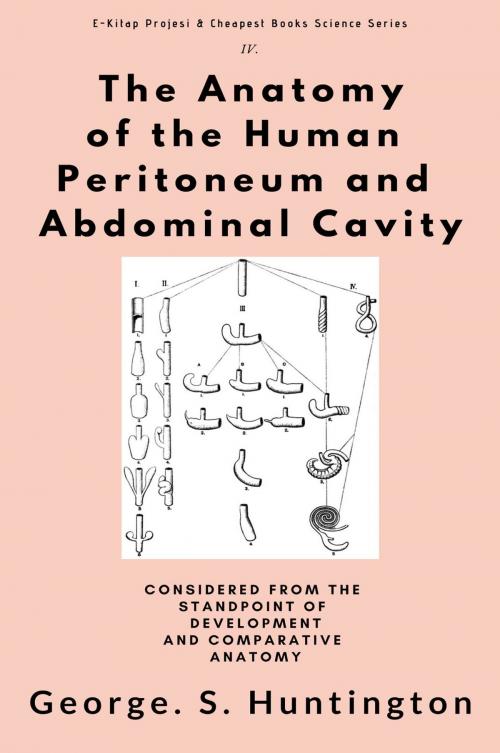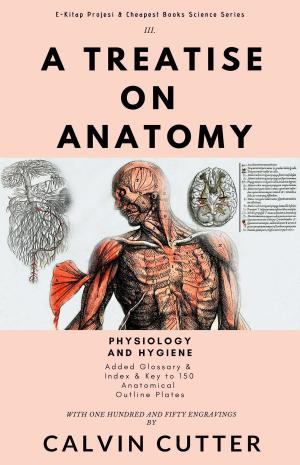The Anatomy of the Human Peritoneum and Abdominal Cavity
Nonfiction, Science & Nature, Science, Biological Sciences, Physiology, Human Physiology| Author: | George S. Huntington | ISBN: | 9786057876492 |
| Publisher: | E-Kitap Projesi & Cheapest Books | Publication: | March 8, 2019 |
| Imprint: | E-Kitap Projesi & Cheapest Books | Language: | English |
| Author: | George S. Huntington |
| ISBN: | 9786057876492 |
| Publisher: | E-Kitap Projesi & Cheapest Books |
| Publication: | March 8, 2019 |
| Imprint: | E-Kitap Projesi & Cheapest Books |
| Language: | English |
** PREFACE**
In the following pages an attempt has been made to emphasize the value of Embryology and Comparative Anatomy in elucidating the difficult and often complicated morphological problems encountered in the study of human adult anatomy.
Moreover, in addition to the direct advance in the method and scope of anatomical teaching afforded by these aids, it is further hoped that the broader interpretation, both of structure and function, obtained by ontogenetic and phylogenetic comparison, will impart an interest to the study of adult human morphology, such as the subject, considered solely in the narrow field of its own limitations, could never arouse.
The book represents part of the course in visceral anatomy as developed during the past fourteen years at Columbia University. The sections dealing with the morphology of the vertebrate ileo-colic junction and with the structural details of the human cæcum and appendix are considered somewhat more fully, as warranted by the extensive material available. The illustrations are for the greater part taken from preparations in the Morphological Museum of the University.
Wherever practicable the direct photographic reproduction of the actual preparation is given. In the case of preparations not suitable for this purpose, careful drawings have been made which offer in every instance a faithful and correct interpretation of the conditions presented by the actual object. A number of the embryonic illustrations are taken from the standard text-books on the subject, due credit being given to their source. I desire to express my sincere thanks to Dr. Edward Leaming, of the Department of Photography and to Mr. M. Petersen, artist of the Anatomical Department of the University, for their skilful and thoroughly reliable work in the preparation of the illustrations.
** George S. Huntington.**
** PREFACE**
In the following pages an attempt has been made to emphasize the value of Embryology and Comparative Anatomy in elucidating the difficult and often complicated morphological problems encountered in the study of human adult anatomy.
Moreover, in addition to the direct advance in the method and scope of anatomical teaching afforded by these aids, it is further hoped that the broader interpretation, both of structure and function, obtained by ontogenetic and phylogenetic comparison, will impart an interest to the study of adult human morphology, such as the subject, considered solely in the narrow field of its own limitations, could never arouse.
The book represents part of the course in visceral anatomy as developed during the past fourteen years at Columbia University. The sections dealing with the morphology of the vertebrate ileo-colic junction and with the structural details of the human cæcum and appendix are considered somewhat more fully, as warranted by the extensive material available. The illustrations are for the greater part taken from preparations in the Morphological Museum of the University.
Wherever practicable the direct photographic reproduction of the actual preparation is given. In the case of preparations not suitable for this purpose, careful drawings have been made which offer in every instance a faithful and correct interpretation of the conditions presented by the actual object. A number of the embryonic illustrations are taken from the standard text-books on the subject, due credit being given to their source. I desire to express my sincere thanks to Dr. Edward Leaming, of the Department of Photography and to Mr. M. Petersen, artist of the Anatomical Department of the University, for their skilful and thoroughly reliable work in the preparation of the illustrations.
** George S. Huntington.**















